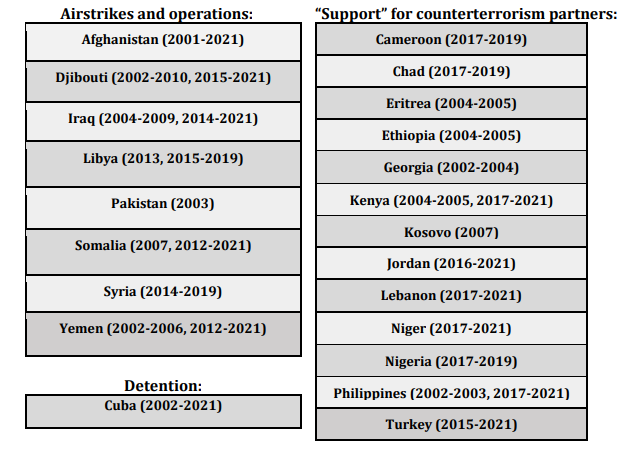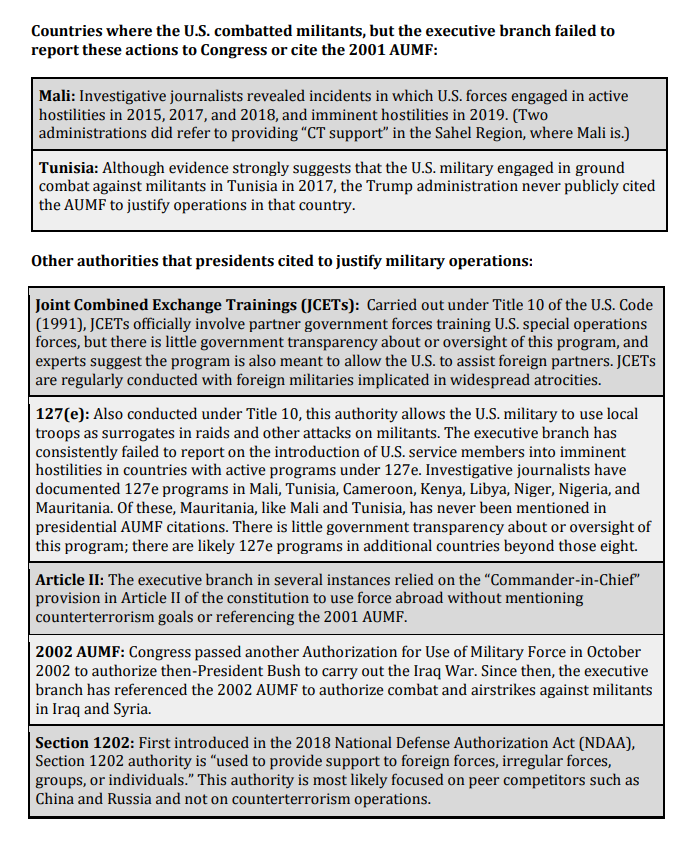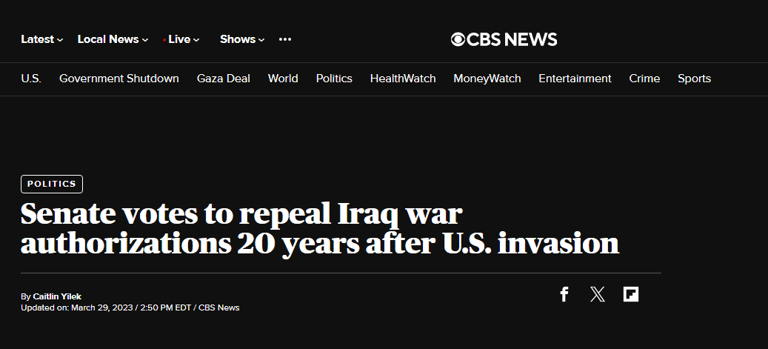The 2001 Authorization for Use of Military Force: A Comprehensive Look at Where and How it Has Been Used
To this day both Democrats and Republicans failed to repeal the 2001 AUMF as Democrats and Republicans promised to repeal it over 15 years ago.
DailyBeastie.Com
10/4/20259 min read


U.S. presidents have cited the 2001 Authorization for Use of Military Force (AUMF) to justify an unknown number of military operations, including airstrikes, combat, detention, and supporting partner militaries, in at least 22 countries.
This paper provides a country-by-country overview of public information about the citations of the 2001 AUMF and details several instances of counterterrorism combat, airstrikes, and “imminent hostilities” that the executive branch did not report on to Congress or cite in relation to the AUMF.
Presidents justified some of these operations through other authorities
This paper draws on information from the Congressional Research Service, “Presidential References to the 2001 Authorization for Use of Military Force in Publicly Available Executive Actions and Reports to Congress,” updated through August 6, 2021.
It also draws on the author’s research for the map, “United States Counterterrorism Operations, 2018-2020,” as well as additional journalistic and government sources.
That map lists a total of at least 85 countries where the U.S. government undertook counterterrorism operations between 2018 and 2020.
The majority of these 85 countries were recipients of U.S. “training” or “assistance” in counterterrorism, some of which is carried out by departments other than the defense department.
Beyond AUMF notifications of “support” for partner militaries, additional training and assistance operations are therefore not covered in this paper.
Also included in the 85 total but excluded from this paper are at least 41 countries where the U.S. carried out formal military exercises in the name of counterterrorism, since those do not require Congressional oversight.
Where this paper overlaps with the map is in reporting on airstrikes and combat, which are hostilities that require executive branch reporting in compliance with the War Powers Resolution.
Military Activity Publicly Justified Under the 2001 AUMF: Countries and Operations This section fleshes out the table on page 1 of this paper with further detail on the 22 countries where publicly available executive actions and presidential reporting to Congress have referenced the 2001 AUMF in connection with initiating or continuing an unknown number of military operations such as airstrikes, combat, detentions, and supporting partner militaries.
Cited language is from the most recent notification in 2021. This section also lays out the inadequacies of those citations.
Countries marked with an asterix* are those where U.S. executive branch citations of the 2001 AUMF have not fully reported on all U.S. operations.
Explanations are found in the footnotes.
AUMF references to airstrikes and operations:
• Afghanistan (2001-2021): “Reorganizing U.S. capabilities to address threats from inside Afghanistan post-withdrawal.”5
• Djibouti (2002-2010; 2015-2021): “Coordinate CT operations in Horn of Africa and the Arabian Peninsula.”
• Iraq: (2004-2009, 2014-2021): “Airstrikes and other necessary actions against the Islamic State of Iraq and Syria (ISIS).”
• Libya* (2013, 2015-2019): “Airstrikes against ISIS.”6
• Pakistan* (2003): “Training missions and combat operations with Pakistani special forces are ongoing near the Afghan/Pakistan border.








Republicans and Democrats promised to repeal the 2001 AUMF over 15 years ago.
Senate Majority leaders Chuck Schumer and GOPer Mitch McConnell publicly promised to repeal the 2001 AUMF but didn't. Year after year Sen. Mitch McConnell and Sen. Chuck Schumer failed to bring the 2001 AUMF to the floor of the Senate to be repealed.
Year after year after year McConnell and Schumer repeatedly lied, promising to repeal the 2001 AUMF next year.
el Presidente Donaldo Trump just used the 2001 AUMF to murder non-combatants in int'l waters.
Each and every U.S. President since George W. Bush has been an AIPAC-funded and supported President who used the 2001 AUMF to kill Muslims and Arabs on Muslim and Arab land. That's no coincidence.


“It is the function of the CIA to keep the world unstable, and to propagandize and teach the American people to hate, so we will let the Establishment spend any amount of money on arms.”
– John Stockwell, former CIA official and author
Just days after the 9/11 attacks on the United States, the U.S. Congress passed the 2001 Authorization for Use of Military Force (AUMF).
Section 2(a) of the 2001 AUMF authorizes the President “to use all necessary and appropriate force against those nations, organizations, or persons he determines planned, authorized, committed, or aided the terrorist attacks that occurred on September 11, 2001, or harbored such organizations or persons, in order to prevent any future acts of international terrorism against the United States.”
Under this AUMF, Congress relinquished its constitutionally assigned war powers in the fight against “terrorism,” ceding to the president its responsibility to decide whether, when, and where the United States chooses war.
The 2001 AUMF is still in effect today. The president must report to Congress within 48 hours a situation in which U.S. forces are introduced into “hostilities” or “imminent hostilities.”
This is mandated by the 1973 War Powers Resolution, established by Congress in the final stages of the Vietnam War to forestall any president from taking the country to war without congressional authorization or awareness.
Since the passing of the 2001 AUMF, the Bush, Obama, Trump, and Biden administrations have referenced this authorization in their reporting to Congress on U.S. military hostilities in a growing number of countries to fight a growing number of militant groups, including Al Qaeda and other groups that government officials subsequently identified as arising from it, including the Islamic State of Iraq and Syria (ISIS) and al-Shabaab in Somalia.
All four administrations have cited the 2001 AUMF while using vague language to describe the locations of operations, failing to accurately describe the full scope of activities in many places, and in some cases simply failing to report on counterterrorism hostilities.
Washington — The Senate on Wednesday voted to repeal the legal justifications used to attack Iraq in 1991 and 2003, endorsing a rare bipartisan effort by Congress to revoke the authority to wage war from the executive branch just days after the 20-year anniversary of the start of the Iraq War.
In a vote of 66 to 30, the Senate approved a resolution to repeal the 2002 authorization for the use of military force, or AUMF, that Congress adopted ahead of the March 2003 invasion by U.S. and allied troops, as well as the 1991 authorization for the first Gulf War.
Proponents of repealing the authorizations say doing so is necessary to prevent future presidents from abusing their power, while not hamstringing current counterterrorism efforts.
"The United States, Iraq, the entire world has changed dramatically since 2002, and it's time the laws on the books catch up with those changes. These AUMFs have outlived their use. These repeals will not harm our service members abroad, nor will it hinder our ability to keep Americans safe," Majority Leader Chuck Schumer said on the Senate floor ahead of the vote. "Every year we keep these AUMFs on the books is another chance for a future administration to abuse them. War powers belong in the hands of Congress."
The legislation now heads to the House, where lawmakers on both sides of the aisle are open to taking action. In 2021, when Democrats controlled the House, the lower chamber voted to repeal the 2002 authorization, but it never received a vote in the Senate. Forty-nine Republicans joined nearly all Democrats in voting for repeal at the time.
"A broad and diverse coalition in the House supports this legislation, and I am hopeful the bill will receive prompt consideration," Republican Sen. Todd Young, who introduced the bill with Democratic Sen. Tim Kaine, said in a statement after the vote.
House Speaker Kevin McCarthy told reporters at a Republican retreat in Florida earlier this month that the measure repealing the war authorizations would likely make it to the floor for a vote.
"It'll have to go through committee," McCarthy said. "I think it has a good chance of one getting through the committee and getting to the floor."
White House press secretary Karine Jean-Pierre said President Biden supports repealing the 1991 and 2002 authorizations and is open to replacing "outdated authorizations" with a "narrow and specific framework that will ensure we can continue to protect Americans from terrorist threats."
"We've long supported the repeal and applaud the Senate for taking action," she told reporters Wednesday. "We urge the House to move quickly as well."
The Senate rejected a number of amendments before voting for final passage, including Republican Sen. Rand Paul's amendment to repeal a separate 2001 AUMF targeting those responsible for the Sept. 11 attacks, which still forms the legal basis for many U.S. counterterrorism efforts. An amendment from Republican Sen. Lindsey Graham to authorize force against Iranian-backed militias operating in Iraq also failed.
The ability to target Iran's proxies in Iraq was a driving issue for Republicans who opposed repealing the authorizations, concerns that were underscored by attacks on U.S. bases in Syria last week in which several U.S. service members were wounded and an American contractor was killed. Mr. Biden ordered strikes against facilities in eastern Syria used by groups affiliated with Iran's Revolutionary Guard in response.
"While I understand theoretically why we want to get rid of the 2002 AUMF because Saddam [Hussein] is gone, I don't understand why we're leaving this vacuum and this doubt," Graham said Monday on the Senate floor, referring to the late Iraqi dictator. "This is easily fixed. You're creating a narrative that's going to come back to haunt us. You think it's an accident within like two days of introducing this idea that they hit us in Syria again?"
Supporters of a repeal said Mr. Biden didn't need congressional authority to retaliate against Iranian-backed groups.
"The president looked at the intelligence, he consulted his advisers, he ordered a strike," Democratic Sen. Bob Menendez said Monday. "And he committed publicly to continue to defend against Iranian aggression and to respond to attacks against U.S. forces. He did so without — without — relying on the 1991 or 2002 authorizations for use of military force against Iraq."
The Senate also rejected an amendment from Republican Sen. Marco Rubio that would have halted the 2002 repeal until the Biden administration certified that Iran has stopped supporting terrorist organizations and violent groups in Iraq and Syria.
During a Senate hearing on the Defense Department's budget on Tuesday, Republican Sen. Tom Cotton questioned whether the administration's delay in informing Congress about last week's Syria attack was connected to the Rubio amendment.
"Do you believe you should've notified us that morning while we were voting on amendments directly related to this kind of attack?" Cotton asked Defense Secretary Lloyd Austin.
Austin denied there was a connection between the amendment vote and notification to Congress, but Cotton was unconvinced.
"I believe there was a conscious decision made not to inform Congress because you fear it might lead to passage of the Rubio amendment, which would kill the entire bill," Cotton said.
President Barack Obama formally ended the Iraq War in 2011 and ordered the withdrawal of U.S. troops, marking "a new phase in the relationship between the United States and Iraq." Three years later, U.S. troops returned to fight the terrorist group ISIS, and the Obama administration cited the 2002 authorization as the legal justification for military operations against the militants.
Mr. Biden has generally cited the 2002 authorization several times when informing Congress of military action, but hasn't specifically invoked it for any single incident, based on a review of White House notifications to Congress.
In 2020, then-President Donald Trump used the 2002 authorization as part of the legal justification for an airstrike that killed Iranian military leader Qassem Soleimani in Baghdad. Congress responded by passing a resolution prohibiting military force against Iran, but Trump vetoed it.


As Senate Majority Leader, Chuck Schumer has advanced efforts to repeal some of the Authorization for Use of Military Force (AUMF) resolutions, but he has failed to repeal the 2001 AUMF.
The Senate has not held a final vote to repeal the 2001 AUMF, and Schumer has consistently focused on repealing the 1991 and 2002 Iraq War authorizations instead.
The 2001 AUMF was not part of the recent Senate repeal bill
In March 2023, the Senate, led by Schumer, successfully voted to repeal the 1991 and 2002 Iraq War AUMFs. This bill was signed into law.
The 2001 AUMF was intentionally excluded from the repeal bill. At the time, Schumer and others argued that the 2002 AUMF posed a greater risk of misuse and that the 2001 AUMF still provided necessary authority for ongoing counterterrorism operations.
An amendment to sunset the 2001 AUMF, proposed by Republican Senator Rand Paul, was overwhelmingly rejected by the Senate, with a final vote of 86–9.
Reasons for the distinction between the Iraq and 2001 AUMFs
Ongoing Operations: The 2001 AUMF, passed after the 9/11 attacks, gives the President broad authority to combat al-Qaeda, its affiliates, and associated forces globally. Military operations against groups like ISIS are still justified under this authorization.
Irrelevant Iraq War Authorities: The 1991 and 2002 Iraq War authorizations were considered outdated, since the war in Iraq was formally over and Saddam Hussein's regime was no longer in power.
Path for Future Action: While the 2001 AUMF remains active, some lawmakers have expressed interest in eventually replacing it with a more narrowly tailored authorization. However, this is a separate and more complicated discussion.


Political news, commentary for the enraged reader
contact@dailybeastie.com
© 2025 DailyBeastie.Com - All rights reserved.

